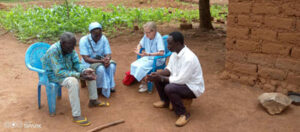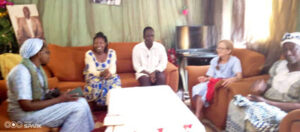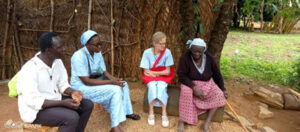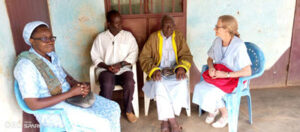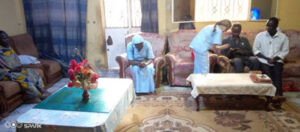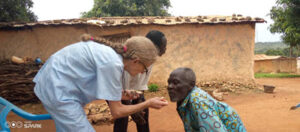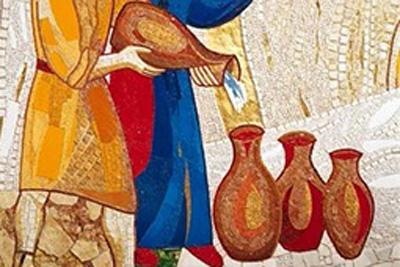I was touched by this phrase from the Gospel of Cana: “They have no more wine”, during my annual retreat at the end of 2020, and I saw those people who could not go to church on Sunday because of a disability: they have no more BREAD!
With the permission of the parish priest, I started to visit them, accompanied by Bouba, a catechist. For a little over a year, every Sunday, after Mass, we go to visit them.
We usually start with Papa Laurent, the furthest away, about half an hour’s walk from the community: an elderly man, bent in two following an accident by an ox. Under the mango tree, in front of his mud brick house, we share the Gospel in Fulfulde (the language of the Fulani, also called Foulbés, mainly cattle breeders, also found in Nigeria, Burkina Faso, Tchad…) or better in his language, Toupouri, when, for example, a young woman from the vocational group accompanies us or Vedette, a sister from my community. In spite of his handicap, he insists on receiving communion on his knees. Before leaving we give him the latest news from the parish.
From there, for several weeks, we have been going to Philippe’s house, retired from Camrail (a railway company), temporarily immobilised following a dislocated hip. There, in his armchairs in front of the TV that the meeting takes place. After the reading of the Gospel, we shared the word received at the homily and Philippe also added his word. This is how the time of sharing is sometimes prolonged…
Then we go down to the chief of our district who receives us under his awning and welcomes us by saying “I was expecting you”. If the words are spoken in French, it is necessary to raise one’s voice because, at about 90 years old, one’s hearing is a bits feeble. We don’t leave without hearing “The mango tree that is there, was planted by Mgr Plumey*, and the house here is the one he built” and he gets up to show us: “I was a catechist for 9 years…” he would say.
We continue to Mama Marie, who walks with difficulty and waits for us, usually sitting on a palm tree trunk. As she is from the Guidar ethnic group, like Bouba, the sharing of words is done in her mother tongue. If her daughter Cécile has not gone to the market, or has already returned, the sharing of news is longer!
A little further on, on our way to Mother Marie Thérèse‘s house, we stopped to greet Papa Mathieu. He too knew Bishop Plumey and benefited from his help in treating his leprosy. This disease has left him handicapped in both hands and feet. “After being in the Catholic Church for years, other churches came to take him but abandoned him…” Bouba tells me. We say a short prayer with him.
Mama Marie Thérèse suffered from hemiplegia 8 years ago. She was very involved in the parish, in the Catholic women’s group, but only recovered a little mobility to get around her house. She told us: “Every Sunday I wake up around 4 or 5 o’clock and I am happy because I know I will be able to take communion”. A widow for about ten years, she is very much surrounded by her children and grandchildren. There is a lot of joie to live in this house. We often end with a song sung by one of her daughters. Before leaving we are entertained with hot or cold drink and sometimes even a meal. On our way out, we glean some fruit from the orchard; at the moment it is avocados. The husband was a great farmer, but also responsible for the gardens in the time of Mgr Plumey; our Sr Judith had him as a teacher. He was nicknamed “Papa Potasse”! (potash)
And to reach Bouba’s father, we cross the Health Centre. Here too we sometimes stop if Bouba has spotted patients during the week who wish to receive the Body of Christ. This is how we visited Mr Léon, a school headmaster, who also suffered from hemiplegia, for 2 or 3 months.
Robert Tizi is our last patient. His three-year-old grandson had informed him: “I saw the sister at mass, she’ll come and see you”. Immobilized for more than a year, following a motorbike accident which caused a fracture of the femur, he moves with difficulty with two crutches. He is already over eighty years old. Originally from Lam (North region), he arrived in Ngaoundéré as a catechist and to be trained in agriculture at the invitation of Bishop Plumey. Until the latter’s assassination, he was the driver of his tractor. A former student of Therese Harvard, –Sister Marie Paule-, I invited him to write to her. You cannot imagine the joy he had the day he got the answer. For months, and perhaps still today, the letter was in his shirt pocket. As the first inhabitant, we learn a lot about the history of our neighbourhood.
After this tour, I arrive at the community around 2pm, happy with these meetings. Carrying the BREAD in this way has been and still is an activity that gives me great joy and nourishes my faith.
It was while visiting Papa Mathieu, a leper, that one day I realised that he was struggling with flies that were landing on a large wound on his left foot where there were no fingers. Every other day I bathed his foot in a plantain infusion and covered it with oil and a compress. I took advantage of the bath to do some cleaning. But our communication was very limited: I did not speak Fulfulde and he did not understand French. When we had to exchange, for example to get him to hold the socks, I had to call on one of the neighbours, usually a child.
As I had to leave for my retreat, I contacted a nurse from the health centre to provide care during my absence. Noëlla, who is in charge of the parish choir, from the group of apostolic ladies, took over. And when I came back, to my great surprise, the wound had regressed very quickly and the surroundings of her small flat had been cleaned. Noëlla had called on her group of apostolic women to help her. Before Christmas, we went with the friends (Catholic Action) to clean her house. One of them had even planned a little perfume. But the night before, at dusk, Bouba, the catechist, and I had to go and kill the many wasps that had hung their nests in every corner of the room and behind the door: this gave him great joy, and he never stopped thanking us. He was also happy that his wound had subsided and that it was no longer hurting him. Now he can walk around the neighbourhood again and get up to fetch a small calabash of millet beer!
One of the young people, who had put all his heart into washing Matthew’s clothes, said after this action: “I want to be a priest but it will be for the poor”. Another said to his catechist: “Why is it that in catechesis we only do the lessons and don’t go to see sick people?”
Getting others involved was a chance!
Marie-Thérèse PUECH, DHS. Novitiate Community in Ngaoundéré. CAMEROON. Published on 3 June 2022
*Monsignor Yves Plumey, born on January 29, 1913 in Vannes -France- and murdered on September 3, 1991 in Ngaoundéré -Cameroon-, was a French Catholic priest of the Congregation of the Oblates of Mary Immaculate (O.M.I.), bishop and then archbishop of Garoua from 1955 to 1984, a pioneer of evangelization in the north of Cameroon and Chad. He was bishop emeritus when he was killed.
The pictures.
1- Papa Laurent. 2- Papa Philippe. 3- The district chief.
4- Mother Marie. 5- Mother Marie-Thérèse. 6- Robert Tizi.
